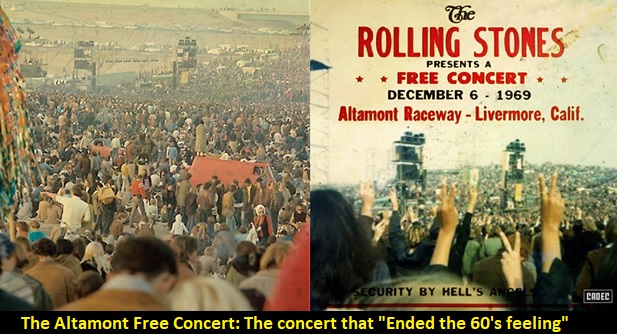I don’t know if many of us remember the Altamont Free Concert in December of 1969 (I know that I did not). This concert was supposed to be “The Woodstock of the West” referring to the wonderful Woodstock concert that happened 4 months earlier on August 15, 1969 on a farm Bethel, upstate New York.
Unfortunately, the Altamont concert turned out to not be as peaceful and full of happy memories as was Woodstock. It turned out the be a very negative experience. With everyone thinking and hoping that this would be “The Woodstock of the West” about 300,000 attended the Altamont Concert – but then the unfortunate things started to happen.
The Altamont Free Concert of 1969 stands as a sad and some would say tragic reminder of the darker side of the 1960s counterculture movement. Altamont was billed as a capstone to the “Summer of Love,” which started in August with Woodstock. This event was meant to be a celebration of peace, music, and community. However, it tragically devolved into chaos and violence, leaving a stain on our 1960’s of idealism and innocence. The Hells Angels, a notorious motorcycle gang, were hired as security—a decision that would have disastrous consequences.
The concert, held on December 6, 1969, at the Altamont Speedway in Northern California, was intended to be “The West Coast’s answer to Woodstock” – a peaceful gathering of like-minded individuals enjoying music and camaraderie. Organized by the Rolling Stones, with a lineup including Jefferson Airplane, Santana, and the Grateful Dead, the stage was set for a historic event. Carlos Santana, Jefferson Airplane, the Flying Burrito Brothers, and Crosby, Stills, Nash & Young (CSNY) followed by The Grateful Dead. The Rolling Stones were supposed to be taking the stage as the final act of the day. But before The Grateful Dead would take the stage and play, they decided to not do so because of the amount of violence and other negative events that were happening at the concert.
From the start, signs of trouble appeared on the horizon. The location for the concert, an old racetrack surrounded by dry hills, was perhaps not the best suited for the tremendous crowd that arrived. Unlike Woodstock, which had ample space and a peaceful rural setting, Altamont was cramped and chaotic. As noted earlier, the Hells Angels, a notorious motorcycle gang, were hired as security—a decision that would have disastrous consequences.
As the day progressed, the atmosphere grew increasingly tense. The sheer size of the crowd, estimated at over 300,000, overwhelmed the relatively small resources available. Food and water were scarce, sanitation was virtually nonexistent, and drugs were everywhere. The Hells Angels, who were supposed to be maintaining order, quickly became a source of fear rather than security. Their aggressive tactics and use of violence only escalated the growing sense of unease and unhappiness.
The situation reached a tipping point during the Rolling Stones’ performance. As the band took the stage, the crowd surged forward and pressed against the barricades separating them from the musicians. The Hells Angels, armed with pool cues and knives, tried to control the crowd, but their efforts only incited more chaos.
Tragically, the violence came to a head during the Stone’s performance of “Under My Thumb.” Meredith Hunter, a young African American man, was brutally beaten and stabbed to death by a group of Hells Angels a few mere feet from the stage. The entire incident was captured on film thus forever immortalizing the horror of that moment.
The aftermath of Altamont was a sobering, sad reckoning for the counterculture movement of our 60s. The idealism of the 1960s, with its message of peace and love, collided with the harsh realities of what unfortunately can sometimes be human nature. The Altamont Free Concert, meant to be a celebration of unity and happiness, instead exposed the fractures and tensions beneath the surface of any group of humans.
In the years that followed, Altamont became a symbol of the end of an era. The dream of the 1960s counterculture, dreams of a world transformed by music and love, was tarnished by the violence of that day. The Rolling Stones themselves would later express deep regret and sorrow over what transpired, acknowledging the failure of their vision for the event.
In conclusion, the Altamont Free Concert of 1969 stands as a cautionary tale—a reminder of the complexities and contradictions of human nature. It was an event that began with the promise of peace and music but ended in tragedy and bloodshed. Today, Altamont serves as a somber reminder of the fragility of idealism and the need for vigilance in the pursuit of a better world.


Get involved!
Comments